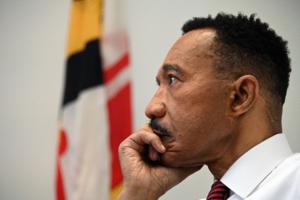Current News
/ArcaMax

Some Pennsylvania school districts are facing budget cuts despite winning a court case over state funding
Two years ago, a Commonwealth Court judge ruled that Pennsylvania had unconstitutionally deprived poor school districts like Delaware County's William Penn of the resources needed to educate students.
Increased state funding followed. But instead of bolstering its programs headed into next year, William Penn is weighing cuts — confronting a $...Read more

As Sweden regulates nicotine products, US pulls back
STOCKHOLM — In its infancy, the Swedish market for nicotine pouches was akin to a sort of Wild West. There were limited industry-led standards and no age restrictions for the products until 2022.
The United States has been more cautious, authorizing fewer products and implementing more safeguards earlier on.
But now, the U.S. is entering its...Read more

Trump fires Librarian of Congress and Baltimorean Carla Hayden
President Donald Trump fired Baltimore native and Librarian of Congress Carla Hayden on Thursday, according to statements from House Democrats.
The longtime Baltimorean, who served as the CEO of the Enoch Pratt Free Library from 1993 until President Barack Obama nominated her to head the Library of Congress in 2016, was the first woman, and ...Read more

Trump abruptly fires Librarian of Congress Carla Hayden
President Donald Trump has fired Carla Hayden, the longtime head of the Library of Congress, in a move that Democratic lawmakers panned as “callous” and “ignorant.”
House Minority Leader Hakeem Jeffries, D-N.Y., described Hayden as “accomplished, principled and distinguished” in a statement Thursday night.
“Donald Trump’s ...Read more

US Rep. Kweisi Mfume of Maryland says Trump, Musk should be arrested
U.S. Rep. Kweisi Mfume, who acknowledged his statement may sound “crazy and ludicrous,” said that President Donald Trump and adviser Elon Musk should be arrested.
The Maryland Democrat’s comments came during a Thursday afternoon press conference, during which most of the state’s congressional delegation voiced indignation over the ...Read more

Judge rejects bid to halt state's Southwest Alaska bear-killing program but faults process
ANCHORAGE, Alaska — An Anchorage Superior Court judge in an order issued this week denied a request to strike down a controversial state-sponsored predator control program that has so far killed 180 bears in Southwest Alaska.
But in the same ruling, Superior Court Judge Christina Rankin criticized the Alaska Department of Fish and Game effort...Read more

Should businesses show tariff costs? What poll found after Amazon considered it
Most Americans feel that businesses should display tariff costs in their pricing, according to a new poll, which was released after one of the nation’s largest retailers contemplated such a policy.
In the latest Economist/YouGov survey, 61% of respondents said that companies should show “how much of a purchase price goes toward paying ...Read more

Can new patrol vehicles crack down on 'video game-styled' driving in California?
The California Highway Patrol is deploying new patrol vehicles in hopes of cracking down on what the agency called “video game-styled” driving.
The vehicles, 100 Dodge Durangos, will be paired with a fleet of Dodge Chargers and Ford Explorers to “observe the most reckless and dangerous behaviors without immediate detection,” according ...Read more

Federal lawsuit alleges UCLA medical school uses a race-based admissions process
A federal class-action lawsuit accuses UCLA's medical school and various university officials of using race as a factor in admissions, despite a state law and Supreme Court ruling striking down affirmative action.
The lawsuit, filed Thursday in California's Central District federal court, was brought by the activist group Do No Harm, founded in...Read more

Motown legend denies sexual assault allegations, continues U.S. tour
Smokey Robinson’s national “Legacy Tour” schedule remains unchanged, including a Friday performance in Biloxi, Miss., days after former employees filed a lawsuit alleging a pattern of sexual assault. Robinson, through his attorney, has denied the claims.
Robinson’s attorney, Christopher Frost, said Wednesday that he plans to seek ...Read more

Trump nominates Daniel Rosen as next U.S. Attorney for Minnesota
President Donald Trump has nominated Minneapolis commercial litigator Daniel Rosen to be the next U.S. Attorney for Minnesota.
Earlier this year, Rosen, of Rosen LLC, was one of three candidates recommended for the position by Minnesota’s Republican congressional delegation to replace Andrew Luger, who stepped down as the state’s top ...Read more

Hurricane season is coming. Here's what the forecasters predict for 2025
Hurricane forecasters are, once again, predicting a busier-than-average hurricane season for the East Coast in 2025.
AccuWeather forecasts are predicting a “dynamic” 2025 season, said lead forecaster Alex DaSilva. Forecasters currently think 13 to 18 named storms could affect the East Coast. Of those, 7 to 10 could become hurricanes and a ...Read more

NYPD moves in to break up pro-Palestinian protest at Brooklyn College
NEW YORK — Protests at Brooklyn College quickly escalated into chaos Thursday evening as pro-Palestine demonstrators attempted to take over Boylan Hall and police were called to the scene.
Social media accounts livestreaming the protest depicted a chaotic scene of protesters clashing with police officers. One post on X appears to show a ...Read more

Marcos-Duterte feud at center of Philippine midterm elections
MANILA, Philippines — Philippine Vice President Sara Duterte won’t be on the ballot in Monday’s midterm elections, but the outcome could determine whether she keeps her job in a high-stakes contest centered around a feud between the country’s two most powerful families.
Following weeks of rallies across the country, more than 18,000 ...Read more

Kemp signs bill banning gender-affirming care for transgender inmates
FORSYTH, Ga. — Gov. Brian Kemp signed a bill Thursday that bans gender-affirming medical care for transgender inmates in Georgia prisons.
The measure had sparked a rift among Democrats and led to a dramatic mass walkout in the state House.
The legislation is part of a broader GOP push to regulate the lives of transgender Georgians. Kemp ...Read more

Trump to end Biden-era program to bridge digital divide
WASHINGTON — President Donald Trump said he would end a program that provides billions to extend internet access in underserved communities, casting it as unfairly providing grants on the basis of race.
“I have spoken with my wonderful Secretary of Commerce, Howard Lutnick, and we agree that the Biden/Harris so-called “Digital Equity Act�...Read more

Edison hit with lawsuit saying Eaton fire exposed people to toxic substances
LOS ANGELES — Southern California Edison was hit with another lawsuit in the wake of the Eaton fire Wednesday, with lawyers claiming families living in or near areas devastated by the Eaton fire may have suffered from dangerous levels of lead, asbestos and other toxic substances.
The Los Angeles County Superior Court suit claims Edison’s ...Read more

Trump to review visa status of protesters arrested in Columbia University library takeover
NEW YORK — Trump officials vowed to review the visa statuses of 80 pro-Palestinian protesters taken into custody during a takeover of a Columbia University library.
“We are reviewing the visa status of the trespassers and vandals who took over Columbia University’s library,” Secretary of State Marco Rubio said on X hours after the brief...Read more

Bryan Kohberger's family will be allowed to attend quadruple murder trial
The immediate family of accused quadruple-murderer Bryan Kohberger will be allowed to attend his trial despite being potential witnesses.
Judge Steven Hippler made the decision public on Thursday, after prosecutors expressed concern over the presence of Kohberger’s parents and sisters, who are expected to testify during his upcoming murder ...Read more

Trump seeks tax hike on wealthy earning $2.5 million or more
WASHINGTON — President Donald Trump is pushing lawmakers to increase tax rates on some of the wealthiest Americans as a way to offset other cuts in his signature economic package.
The president’s proposal calls for creating a new 39.6% tax bracket for individuals earning at least $2.5 million, or couples making $5 million, according to ...Read more
Popular Stories
- Trump fires Librarian of Congress and Baltimorean Carla Hayden
- Trump abruptly fires Librarian of Congress Carla Hayden
- US Rep. Kweisi Mfume of Maryland says Trump, Musk should be arrested
- Federal lawsuit alleges UCLA medical school uses a race-based admissions process
- Judge rejects bid to halt state's Southwest Alaska bear-killing program but faults process





